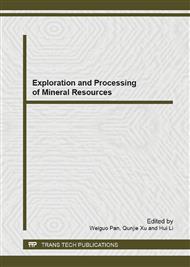p.589
p.593
p.597
p.601
p.606
p.610
p.614
p.618
p.624
Design of Well Log Processing System for Gas Hydrate
Abstract:
As a new efficient energy, the exploration work for gas hydrate increasingly attracts world attention. This paper introduces the advances in gas hydrate exploration, and then discusses the importance of applying geophysical logging in the work. Based on the characteristics of gas hydrate well log data, this paper discusses its process, and we designed and developed the gas hydrate logging processing system combined with computer technology. The applications in work showed that the system could process well log data quickly and effectively, and provide a strong support for the exploration work.
Info:
Periodical:
Pages:
606-609
DOI:
Citation:
Online since:
December 2013
Authors:
Price:
Сopyright:
© 2014 Trans Tech Publications Ltd. All Rights Reserved
Share:
Citation:


